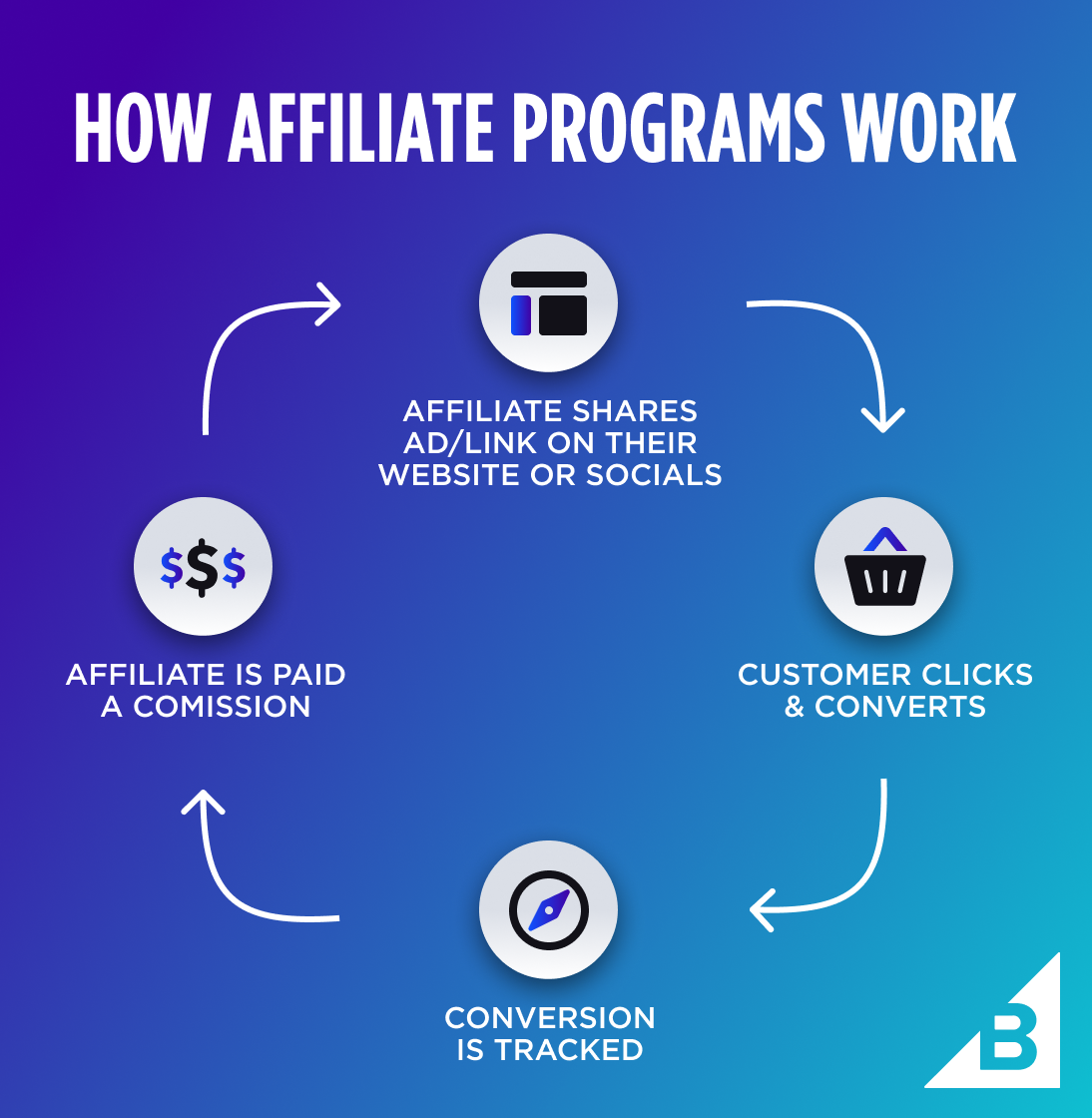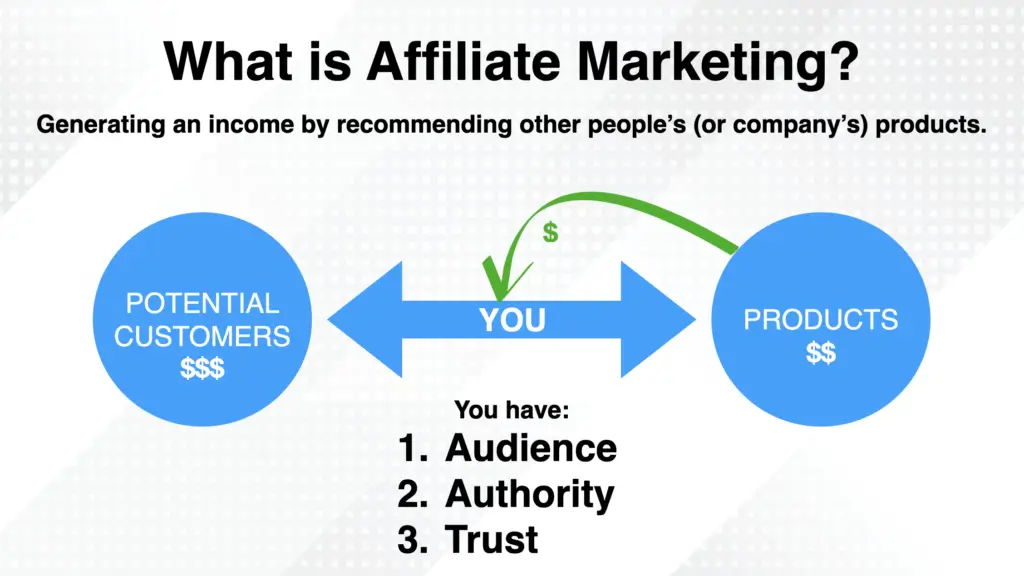What is It Affiliate Marketing: Unveil the Earning Potential
Affiliate marketing is a performance-based strategy where affiliates earn commissions for promoting products or services. It involves a partnership between a company and individuals who promote their products in exchange for a commission.
In today’s digital age, affiliate marketing has become a popular way for businesses to expand their reach and drive sales. By leveraging the power of affiliate partners, companies can tap into new audiences and increase their revenue streams. For affiliates, it offers a flexible and low-risk way to earn money by promoting products that align with their interests and expertise.
With the right strategy and partnerships, affiliate marketing can be a win-win for both businesses and affiliates alike.

Credit: www.authorityhacker.com
Introduction To Affiliate Marketing
Explore the world of Affiliate Marketing – a performance-based strategy where businesses reward affiliates for driving sales. It involves promoting products or services through unique links to earn commissions on successful referrals. Start monetizing your online presence today with Affiliate Marketing.
Affiliate marketing has become a popular source of income for people looking to make money online. It is a performance-based marketing strategy in which an affiliate earns a commission by promoting other people’s or company’s products. In this blog post, we will discuss the rise of digital sales and provide a brief overview of affiliate marketing.The Rise Of Digital Sales
The digital era has transformed the way we shop and consume products. With the rise of online shopping, e-commerce has become a trillion-dollar industry, and it’s only getting bigger. According to Statista, global e-commerce sales are expected to reach $6.54 trillion by 2023. This shift towards online shopping has created a massive opportunity for businesses and individuals to earn money through affiliate marketing.Affiliate Marketing: A Brief Overview
Affiliate marketing is a type of marketing where an affiliate promotes a product or service on their website or social media platform. When a user clicks on the affiliate link and makes a purchase, the affiliate earns a commission. The commission rate varies depending on the product and the affiliate program. There are several benefits of affiliate marketing, including low start-up costs, passive income, and the ability to work from anywhere. However, it requires effort and dedication to build a successful affiliate marketing business. In conclusion, affiliate marketing is a lucrative way to earn money online, and it’s not going away anytime soon. As the digital world continues to grow, businesses and individuals can take advantage of affiliate marketing to generate income.How Affiliate Marketing Works
Affiliate marketing is a performance-based marketing strategy where businesses reward affiliates for driving traffic and sales to their websites. This type of marketing works on a commission basis, with affiliates earning a percentage of the revenue generated from their referrals. In this section, we’ll delve into how affiliate marketing works, exploring the affiliate marketing model and the key players involved.
The Affiliate Marketing Model Explained
Affiliate marketing operates on a simple yet effective model. It involves three primary parties: the merchant, the affiliate, and the consumer. The merchant, also known as the advertiser or the brand, is the entity selling a product or service. The affiliate, often referred to as the publisher, promotes the merchant’s products or services to consumers in exchange for a commission. The consumer, in this context, is the individual who makes a purchase or takes a desired action, such as submitting their contact information or signing up for a service.
Key Players In Affiliate Marketing
The key players in affiliate marketing include:
- Merchants: The businesses or brands that offer products or services for promotion by affiliates.
- Affiliates: Individuals or entities that promote the products or services of merchants to earn commissions.
- Consumers: The end-users who purchase products or take specific actions through the affiliate’s marketing efforts.
Affiliate networks and tracking platforms also play a crucial role in facilitating affiliate marketing partnerships and tracking the performance of affiliate campaigns.
Types Of Affiliate Marketing Programs
Affiliate marketing is a popular and effective way for individuals and businesses to earn passive income by promoting products or services for others. There are various types of affiliate marketing programs, each with its own unique approach to compensating affiliates. In this section, we will explore the three main types of affiliate marketing programs: Pay-Per-Click (PPC), Pay-Per-Sale (PPS), and Pay-Per-Lead (PPL).
Pay-per-click (ppc)
Pay-Per-Click (PPC) affiliate marketing programs reward affiliates based on the number of clicks generated through their promotional efforts. In essence, affiliates earn a commission every time someone clicks on their affiliate link, regardless of whether a purchase is made or not. This type of program is especially beneficial for affiliates who have a large following or are skilled at driving traffic to their affiliate links.
Pay-per-sale (pps)
Pay-Per-Sale (PPS) affiliate marketing programs are the most common type of affiliate program. With PPS, affiliates earn a commission for every sale that is made through their referral. This means that affiliates have to focus on promoting products or services effectively in order to drive conversions. PPS programs often offer higher commission rates compared to other types of affiliate marketing programs, making them attractive to affiliates who can generate consistent sales.
Pay-per-lead (ppl)
Pay-Per-Lead (PPL) affiliate marketing programs compensate affiliates for generating leads or potential customers for the merchant. In this type of program, affiliates are rewarded when a visitor they refer takes a specific action, such as signing up for a newsletter, filling out a form, or requesting a quote. PPL programs are popular in industries where customer acquisition is a priority, as they allow businesses to build their customer base and increase their chances of making sales in the long run.
In conclusion, understanding the different types of affiliate marketing programs is essential for choosing the right approach that aligns with your goals and strengths as an affiliate marketer. Whether you prefer PPC, PPS, or PPL programs, each offers unique opportunities to earn passive income and build a successful affiliate marketing business.

Credit: www.bigcommerce.com
Getting Started As An Affiliate
Welcome to the world of affiliate marketing! If you’re looking to monetize your website or blog, becoming an affiliate is a great way to earn passive income. In this guide, we’ll walk you through the steps to get started as an affiliate marketer. From choosing the right program to setting up your affiliate platform, we’ve got you covered.
Choosing The Right Program
When it comes to choosing the right affiliate program, it’s important to consider the products or services that align with your website’s niche or target audience. You want to promote something that your readers will find valuable and be more likely to purchase. Here are some factors to consider when selecting an affiliate program:
- Relevance: Ensure that the products or services offered by the program are relevant to your website’s content.
- Commission Structure: Look for programs that offer competitive commission rates and a fair compensation structure.
- Cookie Duration: Check the cookie duration, which determines how long you’ll earn a commission after a visitor clicks on your affiliate link.
- Brand Reputation: Research the reputation of the brand or company behind the program to ensure they have a positive image.
By carefully considering these factors, you can choose an affiliate program that not only aligns with your website’s niche but also offers lucrative opportunities for earning commissions.
Setting Up Your Affiliate Platform
Once you’ve chosen the right program, it’s time to set up your affiliate platform. This is where you’ll manage your affiliate links, track your performance, and monitor your earnings. Here’s how to get started:
- Sign up with an Affiliate Network: Joining an affiliate network like Amazon Associates, ShareASale, or CJ Affiliate can provide you with access to a wide range of affiliate programs.
- Generate Affiliate Links: Once you’ve joined an affiliate program, you’ll be given unique affiliate links. These links contain a tracking code that identifies you as the referrer.
- Place Affiliate Links Strategically: Incorporate your affiliate links naturally within your website’s content, ensuring they are relevant to the context. Avoid being too promotional or spammy.
- Track Performance and Optimize: Regularly monitor your performance metrics, such as click-through rates and conversion rates. Analyze the data to identify areas for improvement and optimize your affiliate marketing strategy.
By setting up your affiliate platform effectively, you can maximize your earnings and ensure a seamless experience for your readers when they interact with your affiliate links.
Strategies For Success
Learn the key strategies for success in affiliate marketing. Discover the ins and outs of this lucrative digital marketing practice, including how to choose the right products, create compelling content, and optimize your affiliate links to maximize your earnings.
Content Is King
Creating high-quality and relevant content is essential in affiliate marketing. Engaging blog posts, informative articles, and compelling product reviews can attract and retain your audience’s attention. Make sure your content is authentic and valuable to your readers to build trust and credibility.
Leveraging Social Media
Utilize social media platforms to promote your affiliate products and reach a wider audience. Engage with your followers, share compelling content, and use eye-catching visuals to capture their attention. Building a strong social media presence can significantly increase your affiliate sales.
Seo For Affiliate Marketing
Implement effective SEO strategies to improve your website’s visibility and drive organic traffic. Optimize your content with relevant keywords, create engaging meta descriptions, and build quality backlinks to boost your search engine rankings. Consistent SEO efforts can lead to sustainable affiliate marketing success.

Credit: www.smartpassiveincome.com
Challenges In Affiliate Marketing
Affiliate marketing presents several challenges that marketers need to navigate successfully to achieve desired results.
Navigating The Competitive Landscape
In the competitive landscape of affiliate marketing, standing out from the crowd is crucial.
Dealing With Ad Fraud
Ad fraud poses a significant threat to the effectiveness and integrity of affiliate marketing campaigns.
Case Studies: Successful Affiliate Marketers
Affiliate marketing is a lucrative way for individuals to earn passive income by promoting products or services for companies. Let’s dive into some case studies of successful affiliate marketers who have achieved remarkable success in this field.
From Novice To Pro: A Journey
Sarah started as a novice in affiliate marketing but through dedication and learning, she became a pro in the industry.
Innovative Strategies That Worked
- Content Marketing: Creating valuable content helped John attract a large audience and drive affiliate sales.
- Social Media Engagement: Emily leveraged social media to engage with her audience and boost affiliate conversions.
Key Takeaways From Successful Affiliate Marketers:
- Consistency: Regularly creating content and engaging with the audience is crucial.
- Testing and Optimization: Experimenting with different strategies and optimizing based on results is key.
The Future Of Affiliate Marketing
Trends To Watch
Affiliate marketing is evolving rapidly with the advancement of technology.
- Increased focus on influencer partnerships
- Growing popularity of niche markets
- Rise of video content for affiliate promotions
Affiliate Marketing And Artificial Intelligence
Artificial intelligence is reshaping the affiliate marketing landscape.
- AI-driven personalized recommendations
- Automated ad placements based on user behavior
- Data-driven insights for optimizing affiliate campaigns
Frequently Asked Questions
What Is Affiliate Marketing?
Affiliate marketing is a performance-based marketing strategy where businesses reward affiliates for bringing them customers. Affiliates promote products or services and earn a commission for each sale or lead they generate. It’s a popular way for individuals to monetize their online presence.
How Does Affiliate Marketing Work?
Affiliate marketing works by allowing individuals to earn money by promoting products or services. Affiliates use unique tracking links to share with their audience. When someone makes a purchase using that link, the affiliate earns a commission. It’s a win-win for businesses and affiliates.
Why Is Affiliate Marketing Important?
Affiliate marketing is important because it provides a cost-effective way for businesses to reach new customers. It also allows individuals to earn money by promoting products they believe in. It’s a mutually beneficial relationship that can drive sales and create passive income opportunities.
What Are The Benefits Of Affiliate Marketing?
Affiliate marketing offers several benefits, including low startup costs, the potential for passive income, and the ability to work from anywhere. It also allows businesses to tap into the power of influencer marketing and reach new audiences through trusted recommendations.
Conclusion
To sum up, affiliate marketing is a popular online business model where affiliates promote products and earn commissions for every sale made through their unique referral link. It’s a win-win situation for both parties involved, as the merchant gains more exposure and sales, while the affiliate earns a passive income.
By choosing the right niche, promoting quality products, and building a loyal audience, anyone can succeed in affiliate marketing. So, if you want to start a profitable online business, consider giving affiliate marketing a try.